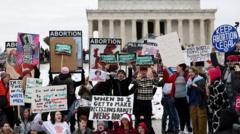In a reflection of ongoing dissent against Trumpism, a diverse group of protesters marched through Washington DC as the President-elect prepared for his inauguration.
Thousands Rally in Washington to Protest Trump Ahead of Inauguration

Thousands Rally in Washington to Protest Trump Ahead of Inauguration
Public outrage is palpable as demonstrators unite against President-elect Donald Trump's inauguration.
Saturday, thousands of protesters, largely women, gathered in Washington DC to voice their opposition to President-elect Donald Trump’s upcoming inauguration. This gathering, known as the People's March, has been an annual event since 2017, originally emerging as part of the Women’s March movement. This year, the coalition behind the march aimed to address what they call "Trumpism" through various collective issues, including climate change and women's rights.
Although organizers anticipated a turnout of 50,000, only about 5,000 protesters participated, marking a decline from previous years. Attendees congregated at several parks before marching toward the Lincoln Memorial, where they held a rally. The movement, described as incorporating “intersecting identities”, encourages participants to draw on past strategies against autocratic leadership.
While the majority of protesters were demonstrating against Trump, a small gathering of pro-Trump supporters showed up at the Washington Monument. One protester, Timothy Wallis, expressed confusion over the divided sentiments in the country but acknowledged the right of the People's March participants to share their views.
The inaugural People's March came after Trump’s win over Hillary Clinton in 2016, when the first massive protest took place the day after his inauguration. Across the country, millions participated in the subsequent Women’s Marches, which prominently featured the iconic pink "pussy hats" and messages against Trump’s administration.
As Trump embarks on his inaugural weekend festivities, a mix of emotions marked the protesters' sentiments. Many voiced frustration over the country’s political direction and a desire for more inclusive representation. Participants like Brooke lamented the election results and insisted on the importance of abortion access, while others, like Susie and Anne, expressed their determination to resist Trump’s policies actively.
Despite the lower turnout this year compared to past marches, the attendees remain resolute, insisting their voices matter in the ongoing dialogue about America's political future.
Reporting by Holly Honderich and Alex Lederman contributed to this article.
Although organizers anticipated a turnout of 50,000, only about 5,000 protesters participated, marking a decline from previous years. Attendees congregated at several parks before marching toward the Lincoln Memorial, where they held a rally. The movement, described as incorporating “intersecting identities”, encourages participants to draw on past strategies against autocratic leadership.
While the majority of protesters were demonstrating against Trump, a small gathering of pro-Trump supporters showed up at the Washington Monument. One protester, Timothy Wallis, expressed confusion over the divided sentiments in the country but acknowledged the right of the People's March participants to share their views.
The inaugural People's March came after Trump’s win over Hillary Clinton in 2016, when the first massive protest took place the day after his inauguration. Across the country, millions participated in the subsequent Women’s Marches, which prominently featured the iconic pink "pussy hats" and messages against Trump’s administration.
As Trump embarks on his inaugural weekend festivities, a mix of emotions marked the protesters' sentiments. Many voiced frustration over the country’s political direction and a desire for more inclusive representation. Participants like Brooke lamented the election results and insisted on the importance of abortion access, while others, like Susie and Anne, expressed their determination to resist Trump’s policies actively.
Despite the lower turnout this year compared to past marches, the attendees remain resolute, insisting their voices matter in the ongoing dialogue about America's political future.
Reporting by Holly Honderich and Alex Lederman contributed to this article.



















